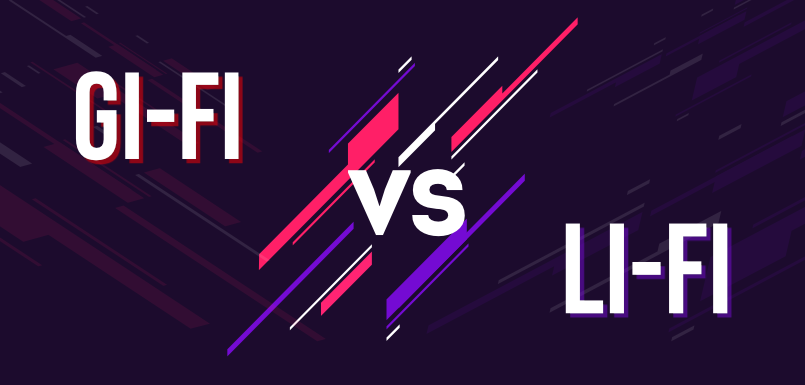Gigabit Fidelity (Gi-Fi):它绝对是第一个安装在芯片上的发射器兼受益者。它是使用 CMOS(互补金属氧化物半导体)工艺制造的,工作频率为 60 GHz。它将允许以每秒 5 吉比特的速度进行视频传输,这高于目前无线保真度的最大传输速率,费用为 10%。它是在澳大利亚墨尔本的NICTA(澳大利亚国家信息通信技术有限公司)开发的。 NICTA 研究人员决定在 57-64 GHz 的频率范围内构建这项创新。在封闭环境中,可访问的 7 GHz 范围导致每秒 5 GHz 的数据速率,通常在 10 米范围内。它适用于 IEEE 802.15.3C 频段。
Light Fidelity (LiFi):它是一种无线光网络技术,它使用来自 LED 的可见光进行数据传输。 Li-Fi开创了无线通信的新革命。作为一名德国物理学家, Herald Hass不断发现利用光传输数据的消息,让世界惊叹不已。 Li-Fi 允许电子设备无需电线即可连接到互联网。基于信号的传播,它比无线保真更安全。 Li-Fi 使用可见光和通信,与无线电波相比速度更快,无线电波比任何其他宽带快 250 倍。

下表列出了 Gi-Fi 和 Li-Fi 之间的差异:
| Based on | Gi-Fi | Li-Fi |
|---|---|---|
| Specification authority |
NICTA (National ICT Australia Ltd) |
IEEE (Institute of Electrical and Electronics Engineers) |
| Operation |
GI-Fi technology transmits the data over the air using the millimeter waves. |
Li-Fi transmits data using light intensity modulation. |
| Data transfer rate |
Provides the speed upto 5 Gbps, and more. |
Provides the speed upto 1 Gbps. |
| Frequency of operation |
Li-Fi can achieve the frequency of operation around 60 GHz. |
Li-Fi can achieve the frequency of operation upto 50 THz. |
| Coverage Range or distance |
GI-Fi range up to 10 meters in particular. |
Li-Fi systems can maximum range up to 100 meters depending upon the light intensity and range of that LED. |
| Data Density |
GI-Fi works within the very high dense environment. |
Li-Fi works with the high density environment. |
| Cost |
Gi-Fi is very cheap, costs only 10 $. |
Li-Fi is cheaper compared to Wi-Fi as it uses light. |
| Security |
Data transfer is less secured compared to Li-Fi. |
Li-Fi provides secure data transfer due to the light blocked by the walls. |
| Power Consumption |
Power Consumption is less than 2MW (milli watts). |
Power Consumption is upto 1 MW (milli watts). |
| Primary Devices |
Mobile phones, home devices, electronics, etc. |
Hospital, vehicle and transportation, aviation, etc. |